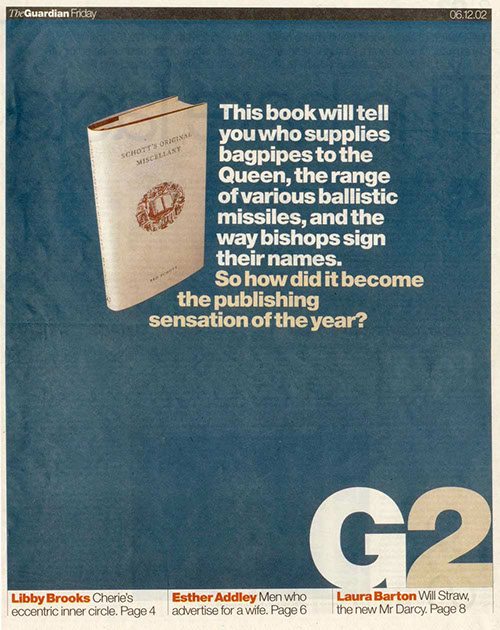
My apologies if you’ve heard this story before.
Schott’s Original Miscellany began life as a Christmas card. While working as a freelance photographer, I sent my clients an annual festive card . . . to remind them that I was alive.
Because they were cheaper to print, these cards tended to be graphic rather than photographic – like the one shown here.
In 2003, I decided to create a little booklet of information of use to photographers, designers, and picture editors. Included were essential data on film stocks, lighting temperatures, cropping specs, chemical formulae, and the like.
To make this somewhat dry content a little more palatable, I added a host of curiosities: the kind of information at the back of our minds and on the tips of our tongue — like wine bottle sizes and unusual phobias.
On my way to pitch this Christmas card idea to a large advertising agency (WPP), I was waylaid by an old friend (Martin) who persuaded me to turn the card into a book.
After some months in the British Library (Humanities 2, mainly), I had researched, written, and typeset (using Quark XPress) 160 pages. I managed to persuade The Pear Tree Press (the one in Stevenage, not the one in Jamaica) to print 50 hard-back copies.
On the advice of another friend (Elinor), I sent one of these books to Nigel Newton, the head of Bloomsbury Publishing (the Harry Potter people). Nigel loved it, a contract was signed, and the book was in the shops just in time for Christmas 2002.
Things began to get a little crazy when, without warning, The Guardian devoted the cover of G2 to the Miscellany and, amazingly, declared the book “the publishing sensation of the year.”
Within weeks of publication, Schott’s Original Miscellany was a number one best-seller in the UK; within months it was also a bestseller in Germany and the United States.
The four books in the Miscellany trilogy have been translated into 21 languages (including Braille), and have sold over 2 million copies.
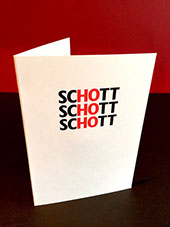
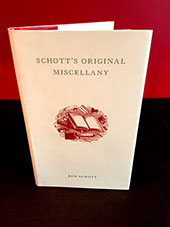
PRAISE FOR THE MISCELLANIES
“Bless you for
Schott’s Original Miscellany!”
– Stephen Fry
“Stands out for its intelligent comic absurdity.”
– The Financial Times
“Originality is like charisma. It’s hard to define, but we know it when we find it … Schott’s Original Miscellany is without doubt the oddest, and possibly the merriest, title you will come across in a long day’s march through the shimmering desert of contemporary publishing.”
– Robert McCrum, The Observer
“This bizarre little book manages to be both totally useless
and nearly indispensable.”
– The Daily Telegraph
“Pointedly pointless,
intentionally aimless and endlessly entertaining.”
– The New York Times
“Stands out for its intelligent comic absurdity.”
– The Daily Telegraph
“Schott, the veritable
god of small things.”
– Vogue, Germany
“Everybody needs this book.
It’s like a book-shaped
Swiss army knife.”
– Die Welt, Germany
“There’s no doubt that this
is a very strange book written
by a very special mind.”
– Die Zeit, Germany
“Somehow Mr Schott turns a collection of trivia into
a window on the world that is hilarious, puzzling, and inspiring”
– The Wall Street Journal
“If we live in an information age, then Ben Schott has become something of a maestro, or perhaps a master chef,
ranging over the whole of knowledge and seasoning
his . . . books with a pinch of this, a drop of that.”
– The Chicago Sun-Times
“Intelligent entertainment at a high level, timed perfectly for out post-modern, deconstructed, and overall scatterbrained time of age.”
– Politiken, Denmark
“This ‘pocket brain’ is a book that can never
be read in one sitting, and can never be put away.”
– Metro, Czechoslovakia
“A crazy and brilliant rabble, with encyclopaedic and
maniacal precision . . . vital and insignificant.”
– Corriere Della Serra, Italy
<
>
MISCELLANY EXTRACTS
Original Miscellany
Food & Drink
Sporting, Gaming, Idling
Quintessential
Cover
Front Matter
Index
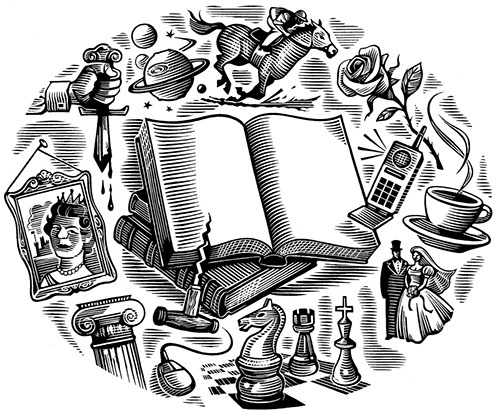
An encyclopaedia? A dictionary? An almanac? An anthology? A lexicon?
A treasury? A commonplace? An amphigouri? A vade-mecum?
Well . . . yes. Schott’s Original Miscellany is all of these and, of course, more.
Schott’s Original Miscellany is a snapper-up of unconsidered trifles. Its purpose is to
gather the flotsam and jetsam of the conversational tide. Importantly, Schott’s Original Miscellany makes very few claims to be exhaustive, authoritative, or even practical.
It does, however, claim to be essential. It is, perhaps, possible to live one’s life without Schott’s Original Miscellany, but it seems a curious and brave thing to attempt.
Cover
Front Matter
Index
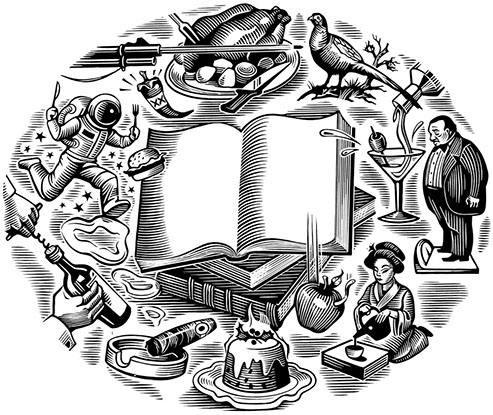
An olla podrida? A smorgasbord? A hot pot? An ambigu? A salmagundi? An amphigouri?
A cocktail? A bouquet garni? A rumfustian? A mirepoix? A kickshaw? A flummery?
Schott’s Food & Drink Miscellany is all of these and, perhaps, more.
Schott’s Food & Drink Miscellany is a snapper-up of unconsidered trifles (in both senses of the word). The book’s purpose is to sweep up the crumbs strewn carelessly across the conversational table-cloth. In a kitchen the size of the Miscellany one could never attempt to prepare a full à la carte service – instead, the book hopes to whet the appetite with a gourmet tasting menu, or dégustation.
Cover
Front Matter
Index
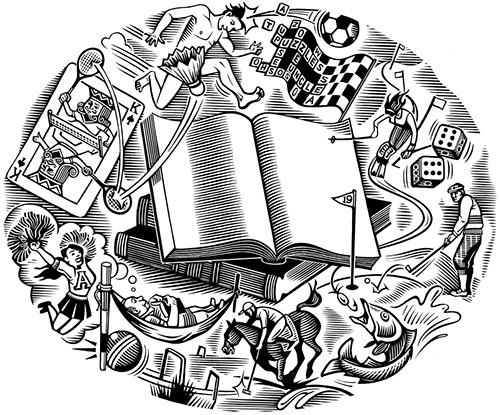
A score-card? A rule-book? A handicap certificate? A team-sheet?
A betting-slip? A dance-card? A note from matron?
Schott’s Sporting, Gaming, & Idling Miscellany casts its net wide across the sporting field – from the Noble Art and the Beautiful Game, to the Sport of Kings and the Gentle Craft. But all this frenetic activity is bound to be tiring, so the armchair athlete will find board games, parlour games, drinking games, and gambling. And, in pursuit of the complete spectrum of human (in)activity, Schott’s Sporting, Gaming, & Idling Miscellany turns its attention to the ultimate pastimes of indolence, from cards, crosswords, and shadow patterns to bathing, sleeping, and dreaming.
Cover
Front Matter
Index
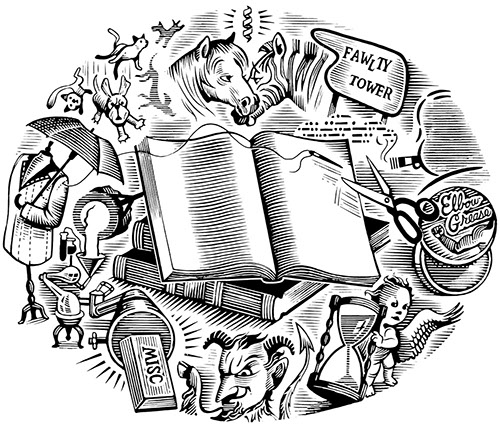
A Quaaltagh? A Quab? A Quaedam?
A Quaesitum? A Quaestor? A Quaffer?
A Qualimeter? A Quelet? A Querent?
A Quisby? A Quodlibet? A Quoz?
Quite.
In alchemy, the quintessence is the fifth element which incorruptibly and ethereally binds air, earth, fire, and water to form the heavens and, according to Isaac Newton, ‘the condensed spirit of the world’. On a good day, alchemy and miscellany have a lot in common. Both seek ‘a lower kind of heaven’, as the alchemist Paracelsus said, ‘by which the sun is separated from the moon, day from night, medicine from poison, what is useful from what is refuse’. Now and then, they both strike gold.